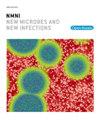Antimicrobial research productivity in Lebanon: A PubMed-Based bibliometric analysis
IF 5.4
Q2 INFECTIOUS DISEASES
引用次数: 0
Abstract
Background
Antimicrobials have revolutionized medicine globally, but emerging antimicrobial resistance due to antimicrobial misuse might revert the world to the “pre-antibiotic era”. Research on the topic contributes to fighting antimicrobial resistance and developing related strategies. Hence, this bibliometric analysis aimed to assess antimicrobial research productivity in Lebanon.
Methods
Relevant publications were retrieved from PubMed, and data were assessed using the VOS viewer. The most research-active institutions, collaboration patterns, and various antimicrobial research areas were reported and discussed.
Results
Research productivity has exhibited an increasing trend over the past 20 years. Private institutions were the most active (90%), while international collaborations were moderate (40%), mainly with institutions in the United States and France. The only visible public-private partnership involved collaboration between the Lebanese University and other institutions. While immunology and molecular biology-related keywords were frequently used before 2012, more clinical (treatment outcome, antimicrobial stewardship, antimicrobial resistance) and environmental cluster-related keywords appeared later, with a low occurrence of resistance and the One Health concept.
Conclusion
This study assessed research productivity related to antimicrobials from Lebanese institutions; it showed the need for greater public sector involvement, expanded national and international research collaborations, and increased focus on critical concepts such as antimicrobial resistance and the One Health approach. Future studies should evaluate research quality and expand the search to additional research platforms other than PubMed for a more comprehensive understanding of the Lebanese research productivity in this field and further optimize strategic measures to combat antimicrobial resistance, optimize research agenda, and improve patient health outcomes.
黎巴嫩抗菌药物研究生产力:基于pubmed的文献计量学分析
抗生素已经彻底改变了全球医学,但由于抗生素滥用而出现的抗生素耐药性可能会使世界回到“前抗生素时代”。对这一主题的研究有助于抗击抗菌素耐药性和制定相关战略。因此,本文献计量学分析旨在评估黎巴嫩的抗菌研究生产力。方法从PubMed检索相关文献,使用VOS查看器对数据进行评估。报告和讨论了研究最活跃的机构、合作模式和各种抗菌研究领域。结果近20年来,我国科研生产力总体呈上升趋势。私立机构最为活跃(90%),而国际合作较为温和(40%),主要是与美国和法国的机构合作。唯一可见的公私伙伴关系是黎巴嫩大学和其他机构之间的合作。2012年之前,免疫学和分子生物学相关的关键词被频繁使用,而更多的临床(治疗结果、抗菌药物管理、抗菌药物耐药性)和环境集群相关的关键词出现较晚,耐药发生率较低,并且有“一个健康”的概念。结论:本研究评估了黎巴嫩各机构与抗菌药物相关的研究生产力;它表明有必要加强公共部门的参与,扩大国家和国际研究合作,并更加重视诸如抗菌素耐药性和“同一个健康”方针等关键概念。未来的研究应评估研究质量,并扩大搜索到除PubMed以外的其他研究平台,以更全面地了解黎巴嫩在该领域的研究生产力,并进一步优化战略措施,以对抗抗菌素耐药性,优化研究议程,改善患者健康结果。
本文章由计算机程序翻译,如有差异,请以英文原文为准。
求助全文
约1分钟内获得全文
求助全文
来源期刊

New Microbes and New Infections
Medicine-Infectious Diseases
CiteScore
10.00
自引率
2.50%
发文量
91
审稿时长
114 days
 求助内容:
求助内容: 应助结果提醒方式:
应助结果提醒方式:


